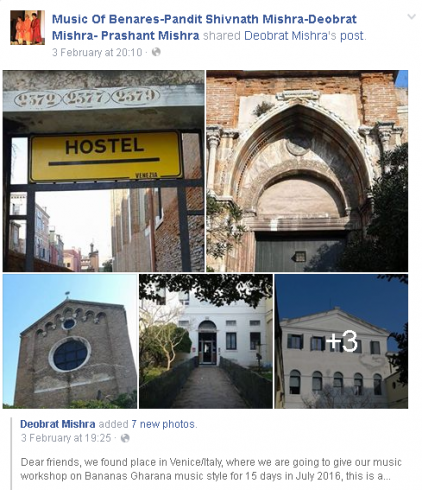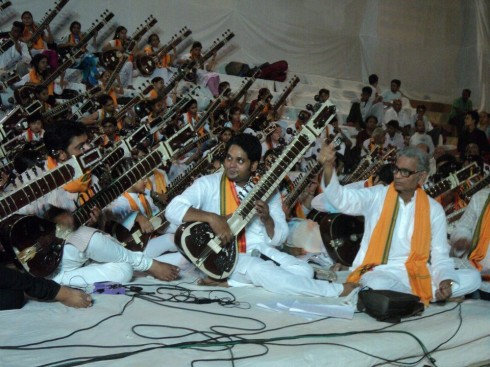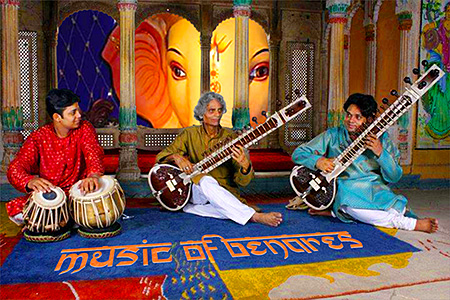Search results for gharana (12)
Benares Gharana Music Concerts Austria
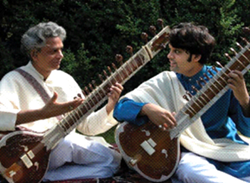
Varanasi (Sanskrit: वाराणसी VÄ�rÄ�ṇasÄ�)is a city situated on the banks of the River Ganges in the Indian state of Uttar Pradesh, 320 kilometres (199 mi) southeast of state capital Lucknow. It is regarded as a holy city by Buddhists and Jains, and is the holiest place in the world in Hinduism (and center of earth in Hindu Cosmology). It is one of the oldest continuously inhabited cities in the world and probably the oldest of India. The Kashi Naresh (Maharaja of Kashi) is the chief cultural patron of Varanasi and an essential part of all religious celebrations.The culture of Varanasi is closely associated with the River Ganges and the river’s religious importance. The city has been a cultural and religious centre in North India for several thousand years.
The Benares Gharana form of Indian classical music developed in Varanasi, and many prominent Indian philosophers, poets, writers, and musicians resided or reside in Varanasi, including Kabir, Ravidas Their Guru Swami Ramanand, Trailanga Swami, Munshi Premchand, Jaishankar Prasad, Acharya Shukla, Ravi Shankar, Girija Devi, Hariprasad Chaurasia, and Bismillah Khan. Tulsidas wrote Ramacharitamanas here, and Gautama Buddha gave his first sermon at Sarnath located near Varanasi (Kashi). Varanasi is home to four universities: Banaras Hindu University, Mahatma Gandhi Kashi Vidyapeeth, Central Institute of Higher Tibetan Studies and Sampurnanand Sanskrit University. Residents mainly speak Hindi and Kashika Bhojpuri, which is closely related to the Hindi language. People often refer to Varanasi as „the city of temples“, „the holy city of India“, „the religious capital of India“, „the city of lights“, and „the city of learning.“ Read More: > HERE <
Seit mittlerweile sieben Generation musizieren Vater und Sohn der Mishra Familie – Pandit Shivanth und Deobrat Mishra – gemeinsam. Music of Benares bringen mit Ihrer Musik den Zauber der mehr als 2000 Jahre alten Tradition der Sitar und Tabla zu uns.Ihre Musik lebt überwiegend von der Improvisation und folgt dem Ausdrucksreichtum der menschlichen Stimme. Deobrath Mishra wurde mehrmals als bester Sitarspieler Indiens ausgezeichnet.
Freitag 29.10.2010, Galerie Werkstatt NUU, www.nuu.at , Gesangs/Sitar oder Tabla Workshop mit Deobrath Mishra nach tel. Vereinbarung am 1, 2 und 3. November unter 0699 19429921 möglich!
Samstag 30.10.2010, 19 Uhr: Minoriten Kloster Tulln www.minoriten.at The Sound of India – Music from Benares, Shivnath & Deobrath Mishra, Sithar, Meister der klassischen indischen Musik, Festsaal/Klubräume – Eingang Nibelungenplatz. http://weltladen-tulln.at Weltladen Tulln: Wir feiern! Der Weltladen Tulln ist 5 Jahre alt geworden! Wir feiern gemeinsam mit den Vereinen Rainbowtrust (10 Jahre alt) und Miteinander leben (20 Jahre alt).
Gharana is a traditional style and way of teaching and performing Indian classical music. This style is many hundreds of years old and has been passed from master to student, from generation to generation. There are many Gharanas or styles, one of the most prominent ones being the Benaras Gharana. It is also called Varanasi Gharana. Over the years, the Benaras Gharana has produced many outstanding vocal, instrumental and dance performers.Like many traditions, this method of performing music and the great Indian cultural heritage, in general, have been threatened due to the lack of dedicated teachers and students.
A very rare Video clip of three generation’s of master musicians performing on same stage. Concert in Tulln-Austria 2009. Pandit Shivnath Mishra & Deobrat Mishra Sitar Artist from India, Prashant Mishra Tabla player. A paṇḍit (Hindi; Devanagari: पण्डित, Sanskrit: paṇḍita) is a scholar, a teacher, particularly one skilled in Sanskrit and Hindu law, religion, music or philosophy. The English loan word pundit is derived from it. Info Click here
The Guru (teacher)-Shishya (student) relationship which was the hallmark of this system is breaking down. If this tradition is not maintained, very soon it might exist only in textbooks. Pandit Shivnath Mishra and his family have descended from a highly talented musical lineage of Benaras Gharana going back several generations. In order to preserve this heritage, so precious to India, and make it accessible to children, Pt. Mishra and his family decided to create the Benaras Gharana Baccha ( The Children’s Project).
The aim of the Academy is to: Establish a school for the teaching of Indian Classical music in the traditional Benaras Gharana style; Provide scholarships to children to assist them in their learning of this musical style; Create opportunities for students and young artists to develop their potential through study and performance; Provide right livelihood for qualified and dedicated teachers.
For this purpose, the Mishra family purchased land in Benares on which to build a residential music school. The construction of the building took around three years to be completed and now the Academy is a well-structured place to receive students from all over the world.
For foreign students, who are committed to studying seriously, the Academy opens its doors providing them with all facilities needed such as a proper music hall, nice rooms with or without toilet attached, spacious kitchen, mineral water filter and dining room, apart from a safe and peaceful atmosphere. Moreover, it is located five minutes walk from the Ganga River.
The Benares Academy is a long-term and ongoing project. Your financial assistance and creative participation is most welcomed and appreciated.The Academy is registered as a charitable non-profit society under number V23536-2000.
-
www.swara.at Indische Musik und Tanz in Österreich
-
Benares www.back-to-life.com
Mishras Music, Sitar,Tabla,Vocal workshop in Venice, July 2016 (1)
Deobrat Mishra – www.deobratmishra.com
Dear Friends
A very good news coming up that we are going to give music workshop in Venice, As it been asked from us that we should do some kind of music workshop in Europe. So now we are announcing that we will be doing 15days music workshop of Sitar,Tabla and Vocal based on Banaraes Gharana Music style. Date will be from first week of July 2016 for 15 days.
I think this workshop will give benefit for people those people who can not travel to India so they can join us in Europe. Also this workshop can have both beginner and advance students. we will have two different class one for beginners and other for advance students. Good thing is that the place we choose for workshop is also a hostel so students who are joining us from different part of the world can stay there.
for arranging things for every one we need that every one who is interested to join us in this workshop should contact us soon so we can work out for accommodation and classes information.
also for all info’s and payment contact us at:
These are photos of the place where workshop will be held:
These are photos of the place where workshop will be held:
Save the date ! Musik of Benares – Musik is love
Varanasi (Hindustani pronunciation: [ʋaːˈraːɳəsi] ( listen)), also commonly known as Benares, Banaras (BanÄ�ras [bəˈnaːrəs] ( listen)) or Kashi (KÄ�śÄ� [ˈkaːʃi] ( listen)), is a city situated on the banks of the Ganges in the Indian state of Uttar Pradesh, 320 kilometres (199 mi) southeast of state capital Lucknow. It is regarded as a holy city by Hindus, Buddhists and Jains. It is one of the oldest continuously inhabited cities in the world and the oldest in India.[3][4] http://en.wikipedia./wiki/Varanasi
In Hindustani music, a ghar�n� is a system of social organization linking musicians or dancers by lineage or apprenticeship, and by adherence to a particular musical style. A gharana also indicates a comprehensive musicological ideology. This ideology sometimes changes substantially from one gharana to another. It directly affects the thinking, teaching, performance and appreciation of music.
The word gharana comes from the Hindi word ‚ghar‘, which means ‚family‘ or ‚house‘. It typically refers to the place where the musical ideology originated; for example, some of the gharanas well known for singing khyals are: Agra, Gwalior, Indore, Jaipur, Kirana, and Patiala. http://en.wikipedia.org/wiki/Gharana
www.music-of-benares.com
Pandit Shivnath Mishra
Deobrath Mishra-Prashant Mishra
Die 3 Meister bringen mit Ihrer Musik wieder den Zauber der mehr als 2000 Jahre alten Tradition der Sitar und Tabla zu uns ins NUU. Ihre Musik lebt überwiegend von der Improvisation und folgt dem Ausdrucksreichtum der menschlichen Stimme. Sie steigert sich zu höchster Erregung und Spannung, welche die Musiker, und auch die Zuhörerinnen, in eine Art Trance-zustand versinken lässt. Seit mittlerweile sieben Generation musizieren Vater und Sohn der Mishra Familie gemeinsam. Pandit Shivanth und Deobrat Mishra spielen seit über 20 Jahren Konzerte auf der ganzen Welt. Deobrat Mishra wurde mehrfach als bester Sitar Spieler Indiens ausgezeichnet. Es ist eine seltene Gelegenheit drei Musiker aus drei Generationen aus einer Familie auf einer Bühne gemeinsam zu erleben ! Ihre Konzerte berühren durch Musik auf höchstem Niveau, mitgetragen von den Bilder des Malers David Müller-Abt, im kleinem intimen Rahmen der Galerie Werkstatt NUU.
Moving pot verwöhnt uns an den drei Abenden mit indischen Köstlichkeiten, kulinarisch- vegetarisch!
Du bist wieder herzlich eingeladen, wenn du kommen magst – bitte unbedingt reservieren…max 30 Personen/Abend !
Mo.5, Mi.7. und Do.8. November 2012
9.Wilhelm Exnergasse 15
Einlass 19h Beginn 20h
Eintritt 25€
inkl. Chai und indischem Essen
Reservierung notwendig ! nuu@gmx.at oder sms/tel: 0699 19429921
p.s unsere Webseite ist leider nicht mehr aktuell, aber eine Neue ist im entstehen…
Galerie Wekstatt NUU 9. Wilhelm Exnergasse 15 nuu@gmx.at www.nuu.at 0699 19429921
http://www.oldindianphotos.in/2012/05/varanasi-benares-in-1937-vintage-video.html
http://www.sacred-destinations.com/india/index.php
http://www.facebook.com/oldindianphotos
http://www.facebook.com/mishramusic

Mishras 2012 Europen Musical tour
Dear Friends,
We are in Varanasi now and wish all of you. We are happy to inform you that our tour for Europe this year will be in October/ November 2012. So we are starting now for booking the Concert dates of Europe and just like to inform you that if you want to book any concert of us then please contact us soon as now we are booking the dates.
We are coming three musician Pandit Shivnath Mishra, myself Deobrat Mishra on Sitar and Prashant Mishra on Tabla. So please contact us soon for any information you need.
Hope to hear from you soon.
Yours, Deobrat Mishra
Sitar Artist.
Contact us at: mishramusic@hotmail.com
Website: www.music-of-benares.com
Cell: 0091-9451586700
Note: we are also sending you a attachment of recent concert photos and Video Link on youtube we did with 108 Sitar players in Varanasi to save holy River Ganges. Please have a look. You can see more picture of it on my facebook account: Deobrat Mishra
My father Pandit. Shivnath Mishra made a history in Varanasi-India to conduct a orchestra of 108 sitar players. Total musician where 151 including Tabla players and Flute players.
Varanasi (Sanskrit: वाराणसी ) is a city situated on the banks of the River Ganges in the Indian state of Uttar Pradesh, 320 kilometres (199 mi) southeast of state capital Lucknow. It is regarded as a holy city by Buddhists and Jains, and is the holiest place in the world in Hinduism (and center of earth in Hindu Cosmology). It is one of the oldest continuously inhabited cities in the world and probably the oldest of India. The Kashi Naresh (Maharaja of Kashi) is the chief cultural patron of Varanasi and an essential part of all religious celebrations.The culture of Varanasi is closely associated with the River Ganges and the river’s religious importance. The city has been a cultural and religious centre in North India for several thousand years.
The Benares Gharana form of Indian classical music developed in Varanasi, and many prominent Indian philosophers, poets, writers, and musicians resided or reside in Varanasi, including Kabir, Ravidas Their Guru Swami Ramanand, Trailanga Swami, Munshi Premchand, Jaishankar Prasad, Acharya Shukla, Ravi Shankar, Girija Devi, Hariprasad Chaurasia, and Bismillah Khan. Tulsidas wrote Ramacharitamanas here, and Gautama Buddha gave his first sermon at Sarnath located near Varanasi (Kashi). Varanasi is home to four universities: Banaras Hindu University, Mahatma Gandhi Kashi Vidyapeeth, Central Institute of Higher Tibetan Studies and Sampurnanand Sanskrit University. Residents mainly speak Hindi and Kashika Bhojpuri, which is closely related to the Hindi language. People often refer to Varanasi as “the city of temples”, “the holy city of India”, “the religious capital of India”, “the city of lights”, and “the city of learning.”
Mishras Press release:
Very rare to see three generation master musician’s on same stage.
11th GENERATION FATHER AND SON SITAR MASTERS of Benares Gharana
From their home city of Benares, an ancient spiritual centre of traditional music and Indian culture, “The Mishras” are bringing classical North Indian Ragas and meditative music to the world audience, gifting the audience with a fabulous performance and a spiritual experience. Join this father and son duet of two of the worlds finest Sitar Artist and Prashant Mishra on Tabla grandson of Pandit Shivnath Mishra as they inspire one another to new levels of loving interplay.
PANDIT SHIVNATH MISHRA
Pandit Shivnath Mishra was born on the 12th of October 1943, in Varanasi (North India). Also known as “Legend of the Sitar”, he is the 10th generation of the prominent Benares Gharana lineage of top class singers including Pandit Bade Ramdas Mishra and Panditji Great Grand Father. Since childhood, his highly musical family could see signs of a masterful musician in him. When Panditji was five years old, he began studying vocal music with his father, Badri Prashad Mishra, and his uncle-guru, Pandit Mahadev Prashad Mishra. However, when he was eight his musical inclination led him to study the sitar. In a family of great classical Indian vocalists, he was the first one who mastered the sitar.
Due to the vocal influence from his family as well as the Benares Gharana tradition, he is one among few artists in Contemporary India who ‘sing inside’ while playing a musical instrument. His lively, powerful and unique style has praised him with innumerous titles by the most representative authorities and institutions of music in and outside India. In 1966, when he was only twenty-three, he received a gold medal in the All India Music Conference, in Calcutta.
1979 marks the beginning of his performances abroad. Sine then, he has been constantly on tour in many foreign countries, among them Germany, Italy, France, Luxembourg, Switzerland, Austria, Japan, Holland etc. In 1999, he gave his first concert in the USA and Canada. During his tours, he has performed with several international jazz artists such as John Handy, Paul Horn, David Freezen, Ben Conrad, Berred Kworrase, George Figgler Aimester among others. Moreover, he participated in many conferences and recitals including the Condolence Metal of Late Prime Minister Mrs. Indira Gandhi, in Germany. He also took part in programs broadcast by the BBC Television and the German Radio.
Being one of India’s premiere sitar artists of all times, Pandit Shivnath Mishra was the Head of the Music Department at the Sampurnanand Sanskrit University of Benares, in Varanasi, for 36 years. At this time, in 1994, he formed the “Music of Benares” which consists of a group of North Indian (Hindustani) classical musicians whose aim is to familiarize audiences all over the world with Hindustani music in general and the Benares Gharana in particular. What is characteristic of the Benares Gharana is exactly the singing of the Thumri, a light Indian classical music that is highly ornamental and thus very emotional and expressive. At a time when many different Gharanas mix with each other, the “Music of Benares” group keeps this ancient tradition alive.
Incorporation of this style with the “Jugalbandi” presentation, in which there are two solo artists sharing the stage, has created a unique synthesis of classical and folk that appeals to audiences everywhere. But this is not just Jugalbandi, this is a duet between a Guru and his Shishya (disciple) and, in this case, between father and son. Seeing this special interaction on stage is no doubt an unforgettable and mesmerizing experience.
Deobrat Mishra – biography
Deobrat Mishra is no doubt one of the most energetic and innovative sitar artists of India. Selectivity, melody and rhythmic complexity are typical features in his lively playing style.
Born in 1976, he represents the 11th generation of the Benares Gharana tradition. As a young child he studied tabla with his mother, Pramila Mishra, who is the granddaughter of the well-known tabla player Pandit Baiju Mishra. He started by studying vocal music with his father at the age of five and began his sitar lessons a year later. That same year, after only six months of studying the sitar, he gave his first public performance on stage. Five years later, he performed for the first time on the All India Radio.
Since 1994 he has been touring throughout Europe with his father. In the same year he was chosen to receive the award of the best young sitar player of India. In 2000 he received the “Jewels of Sound Award” in Mumbai. His many projects include music workshops, solo performances for radio and television as well as world music programs with Indian and European artists. Moreover, he is the one in charge of cultural events and music lessons provided by the Academy of Indian Classical Music, the school he founded along with his father, Pandit Shivnath Mishra, in 2006.
Recently, he received a Masters degree in sitar from the Prayag Sangit Samiti in Allahabad. Among many other projects, the Mishras performed and recorded their music with the Western Symphony Orchestra of Italy in 2005. Nowadays, they fully dedicate their art to similar projects including annual tours around the world.
Above all, the Mishras (father and son) serve as two of India’s leading cultural ambassadors of our times
Prashant Mishra is one of the best young Tabla player of benares music tradition. When he was five he started to learn tabla with the family member of Biru Mishra of Varanasi also studying Tabla presently with Mr.Chakkan lal Mishra(Student of Great Tabla player Anokhelal Mishra..
Soon after few years of hard practice with his grandfather Pandit Shivanath mishra and uncle Deobrat mishra he was able to perform with Mishras His skills beautifully compliment and support the Mishras in their concerts.
http://timesofindia.indiatimes.com/topic/Aviral-and-nirmal-flow-of-the-Ganga/news
In 2004 he won first prize in Tabla competition organized by Sangeet Natak Academy Uttar Pradesh India. He received many awards for his tabla playing at many different places. The Mishras tour will help to support the Academy Of Indian Classical Music School in Varanasi, India.
Additionally, the Mishras support their Academy of Music in Benares, India where they keep alive the tradition of their music amongst young musicians. Every January and February, the Academy is open to international students of all ages and skill levels. These study tours to India are a cultural experience combining ashram style living and intensive music instruction in one of the world’s oldest cities.
Visit: www.benaresmusicacademy.co
For more information, contact Deobrat Mishra: mishramusic@hotmail.com
Visit our website: www.music-of-benares.com
http://www.gangaaction.com/
http://
http://
#Previous #articles #videos #benares #gharana
#Previous #articles #save #ganga #water #humanrights
Note: Mishra or Misra (Hindi: „मिश्र“ „मिश्रा“) is a Hindu Brahmin surname found mostly in the northern and central parts of India. It is one of the most widespread Brahmin surnames in the fertile Gangetic plain region and in the Indian states of Delhi, Bihar, Uttar Pradesh, Uttarakhand, Madhya Pradesh, Rajasthan, Orissa, Assam and West Bengal. It is also found in countries such as Guyana and Trinidad and Tobago under the anglicized version of Misir, due to migration owing to agricultural/plantation employment. The surname is also found in Nepal, Fiji and Mauritius, as well as in other Indian diaspora communities.
In Hinduism, Brahmin refers to the class of educators and preachers. It is the highest class in the caste system. There are many references in the Ramayana and Mahabharata about the importance of a Brahmin. In the Vedic period, the Brahmins preferred isolation and solely dedicated their life to propagating knowledge and Dharma. However Misras have historically been martial Brahmins and in earlier years, many were drafted into the army.
Europe Tour Plan, Mishras- Sitar masters
www.music-of-benares.com www.deobratmishra.com
Pandit Shivnath Mishra
Deobrath Mishra-Prashant Mishra
Mi.2, Do.3 und Fr.4 November 2011
9.Wilhelm Exnergasse 15
Einlass 19h-Beginn 20h
Eintritt 25€, inkl. Chai und indischem Essen
Seit 5 Jahren kommen „Music of Benares“ auf ihrer Europatour nach Wien, und spielen exclusiv in der Galerie Werkstatt NUU. Diese Abende berühren durch Musik auf höchstem Niveau in kleinem Rahmen, inmitten der Bilder des Malers David Müller-Abt. Es ist die seltene Gelegenheit 3 Meistermusiker aus drei Generationen aus einer Familie gemeinsam auf der Bühne zu erleben.
Love is a performable miracle – thats what the Mishras do !!!
Ihre Musik folgt überwiegend dem Ausdrucksreichtum der menschlichen Stimme. Deobrath Mishra wurde mehrmals als bester Sitarspieler Indiens ausgezeichnet.
Den Gaumen verwöhnt Moving pot mit indischen Köstlichkeiten, kulinarisch- vegetarisch! Wir laden sie herzlich ein die Mishra Familie ( Großvater, Sohn ,Enkel ) live im NUU zu erleben und bitten Sie unbedingt zu reservieren.
Reservierung unter: musicofbenares@gmx.at oder 0681 20908122
Deobrath Mishra bietet auch einen workshop an, Infos im Mailanhang ! Keep your spirit high ….music is love !
Galerie Werkstatt NUU www.nuu.at Denise Narick
Betreff: Mishras- Sitar masters Von: „Deobrat Mishra“
Dear Friends
We are now in Europe and will start our First concert on 21st October. It is too hard for us to even think that Mataji(My Mother) is passed away on 30th Sep. I was thinking first to cancel my tour but then I remember my mother wish was that she always wanted to see me play the music and so this inspiration I got from her and come back to do our musical tour of Europe 2011.
This tour is dedicated… to my mother Pramila Mishra and hope to see some of you. My father and Prashant is with us in this tour so this going to be special tour. Also if you want to book any concert please contact us soon.
Mishras Europe tour plan 2011 >>>
Sufi Music Of Kashmir (Sufiyana Mousiqui)Part 1
Ghulam Mohamad Saznawaz is the only existing master of Kashmiri Sufiyana Music in the world. The most tragic part of Kashmiri sufiyana music is that with the Maestro Ghulam Mohamad Saznawaz the art will be lost to posterity, now very old with his age the mastero has opened a school to teach Kashmiri Sufiyana Music free of charge but this school does not attract many students from Kashmir because of the religious and social prejudice among the majority of Kashmiris. This is sad but its true that still musicians are considered as of a lower class or of low moral and as if they can not do something useful thats why they chose to be musician.
http://saznawazgharana.blogspot.com/
http://www.facebook.com/SuFiYaNa MuSiQuI Of KaShMiR
With the goal of uniting conservation, communities and sustainable travel, TIES is committed to promoting the principles of ecotourism and responsible travel around the world.
http:// www.disappearancesinkashmir.com/
http://www.hrw.org/legacy/reports/1999/kashmir/
Ali Akbhar College of Music – New CD
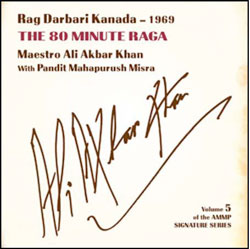
> Ali Akhbar College of Music, LAYA Project <
Ali Akbar Khan (Bengali: আলী আকবর খাঁ) (14 April 1922 – 18 June 2009), often referred to as Khansahib or by the title Ustad (master), was a Hindustani classical musician of the Maihar gharana, known for his virtuosity in playing the sarod. Khan was instrumental in popularizing Indian classical music in the West, both as a performer (often in conjunction with Sitar maestro Ravi Shankar), and as a teacher. He established a music school in Calcutta in 1956, and the Ali Akbar College of Music in 1967, which is now located in San Rafael, California and has a branch in Basel, Switzerland. Khan also composed several classical ragas and filmscores. He was a Distinguished Adjunct Professor of Music at the University of California, Santa Cruz. Read More: > HERE <
„Darbari Kanada“ is a late-evening rag played between 9:00 PM and midnight. Most classical performers treat this rag with reverence, as it is one of India’s most majestic ragas. This session took place in 1969 in a New York City church, with the natural reverberation adding a tremendous and distinct element, along with audible sounds of the city streets. No attempts were made to alter the original content of the master recordings. Ali Akbar Khan’s electrifying performance of this heroic rag adds notable weight to his stature as „a musician’s musician.“ He plays with subtlety and control along with the strength of a master.
Now Available at the Ali Akbar College of Music:
ALI AKBAR KHAN
Vol. 5 of the AMMP Signature Series
TRACK LISTING
CD 1: Alap (Solo)
CD 2: Gat (Tabla Accompaniment)
Original 80-minute concert recording
Disc Two features accompaniment
from Pandit Mahapurush Misra
Packaged with liner notes and
archival photos
Winter Session 2010 Starts Sunday, February, 14th – This session features a full lineup of Introductory Courses, Youth Courses and Online classes via Webcast. Please check our schedule or you may also register now.
Donations to the AACM are much appreciated! To date we have raised $11,000 of our $30,000 goal toward college operations. Thank you to our current members for your continued support!
THE EAST MEETS WEST MUSIC INC.

http://eastmeetswestmusic.com/
> Ali Akhbar College of Music, LAYA Project <
> GHARANA – Benares Music Academy <
„There is something beautiful about the stage. There is a performer and there is an audience. Nothing is in the way. The sound remains pure and unburdened by things like marketing and distribution. My hope is for this label to be more like a stage and less like the music business as I have experienced it.”
–Ravi Shankar
Ravi Shankar (Bengali: রবি শংকর; born 7 April 1920), often referred to by the title Pandit, is an Indian sitarist and composer. He has been described as the most well known contemporary Indian musician by Musik in Geschichte und Gegenwart.Shankar was born in Varanasi and spent his youth touring Europe and India with the dance group of his brother Uday Shankar. He gave up dancing in 1938 to study sitar playing under court musician Allauddin Khan. After finishing his studies in 1944, Shankar worked as a composer, creating the music for the Apu Trilogy by Satyajit Ray, and was music director of All India Radio, New Delhi, from 1949 to 1956. Read more: > HERE <
WELCOME – The Ravi Shankar Foundation proudly announces the launch of East Meets West Music. EMW Music is a listener’s passport to the sitar master’s personal archive of thousands of hours of live performance audio, film footage, interviews, and studio masters. By making personally selected source material from this collection available, Ravi Shankar hopes to bridge any divide between his recorded music and his audience. EMWMusic also provides a vibrant space for new artists, projects, and collaborations. We are thrilled to begin this journey with our long time supporters and new fans alike.
The aim of the Benares Academy is to:
- Establish a school for the teaching of Indian Classical music in the traditional Benaras Gharana style;
- Provide scholarships to children to assist them in their learning of this musical style;
- Create opportunities for students and young artists to develop their potential through study and performance;
- Provide right livelihood for qualified and dedicated teachers.
For this purpose, the Mishra family purchased land in Benares on which to build a residential music school. The construction of the building took around three years to be completed and now the Academy is a well-structured place to receive students from all over the world.
For foreign students, who are committed to studying seriously, the Academy opens its doors providing them with all facilities needed such as a proper music hall, nice rooms with or without toilet attached, spacious kitchen, mineral water filter and dining room, apart from a safe and peaceful atmosphere. Moreover, it is located five minutes walk from the Ganga River.
The mission of the Ali Akbar College of Music is to teach, perform and preserve the classical music of North India, specifically the Seni Baba Allauddin Gharana (tradition), and to offer this great musical legacy to all who wish to learn. The Ali Akbar College of Music offers education in the classical music of North India at the highest professional level. Our primary instructors are the internationally recognized sarode Maestro Ali Akbar Khan and the master of percussion Pandit Swapan Chaudhuri, from whom our students learn the necessary musical skills, knowledge and understanding to contribute significantly to musical life.
At a dargah (Islamic shrine) situated in the south-east part of India, the singers sing devotional songs in the Qawwali style, with percussion accompaniment. The lyrics are a mix of the local south Indian language, Tamil and Arabic, while the music style is that of northwestern India.
These artists are featured in the award-winning music documentary LAYA PROJECT (www.layaproject.com), and have also released a full album called NAGORE SESSIONS, available at www.earthsync.com
A tribute to the resilience of the human spirit, LAYA PROJECT is a documentary about the lives and music culture of coastal and surrounding communities inthe 2004 tsunami-affected regions. Some of these performances are rare, and documented for the first time.
Sree Debasish Dass (Pintoo) Born in a very tradtional musical familly on May day, Sree Debasish Dass has carved a special niche for himself in the world of Tabla, the king of Indian percussion instruments. He was initiated into Tabla at the tender age of five by his beloved father Late Dilip Kumar Pandit a highly acclaimed Tabla player of Farukkabad Gharana.
True to his date of birth, which symbolises sincere labour, > Debasish < (popularly known as Pintoo) put in years of relentless effort and unfailing dedication to master the art of playing Tabla. He completed his graduation from the world famous Visva-Bharati University founded by the great > Rabindra Nath Tagore < . Thereafter he plunged fully into the subtle complexities Tabla and completed his Diploma in music, Bachelor and Master degree in Tabla.
http://swara.at/ (Plattform f. Indische Musik und Tanz in Österreich)
http://www.alankara.com/ (Ver. z. Förd. d. Ind. Musik ,Kunst in Wien)
http://www.indigenouspeople.net/taino.htm (Ind. Friends, Haiti)
NADA YOGA is the core of Dhrupad Music

> MAJOR SCHOOL´s OF DRHRUPAD <
http://dagarvani.org ( info & free videos)
Dhrupad is the oldest surviving form of Indian Classical music and traces its origin to the chanting of VEDIC HYMNS and MANTRAS. Though a highly developed classical art with a complex and elaborate grammar and aesthetics, it is also primarily a form of worship, in which offerings are made to the divine through sound or n�da. Dhrupad can be seen at different levels as a MEDITATION, a mantric RECITATION, a worship , a YOGA or TANTRA based on the knowledge of the NADIS and CHAKRAS and also purely as a performing art portraying a universe of human emotions. It is mainly a vocal tradition based on the practice of NADA YOGA, but is also performed on instruments like the Rudra Veena and the Sursring�r. For the past five centuries Dhrupad has mainly thrived under the patronage of Mughal and Rajput kings. Read More: > HERE <
Nada Yoga is the core of Dhrupad Music
By Dr.Acharya Trigunateet Jaimini
Indian traditional systems of health and healing also include various musical treatment approaches. A few healing traditions are also integrated in modern music therapy practice in India.
Vedic traditions dating back roughly 5000 years ago had a great intuition about the power of sound and intonation. The Vedic chants and music which had more sound and rhythm, used as a source of healing and up liftment reflected the intuition that each intonation and inflection of voice could have beneficial or adverse effects.
Music Raga Therapy , an extinct sanskrit treatise, as its name implies dealt with curative ragas and suggested specific ragas with specific therapeutic and a prophylactic medium in clinical and educational settings. the Vedic system of health care concerned with healthy living and not disease specific takes into account the patient’s entire personality, body, mind and the spirit and guides the participants for a healthy living along with the therapeutic measures that relate to physical, mental, social and spiritual harmony.
Nada Yoga is the core of Dhrupad, the most ancient style of Hindustani Classical Music. Originally only sung by priests in the temples as an act of worship, it induces a deep meditative state in the singer as well as the listener.
Vrindaban, the abode of Lord Krishna, situated on the bank of the Holy river yamuna is known for its devotional classical music „Dhrupad“. Bhagwat Puran states that Lalita Sakhi sang in Dhrupad style during the famous „Raas“-dance. Since then this tradition of ancient form of worship of Lord Krishna has been maintained in the temples of Vrindaban. Dhrupad is a particular north Indian style of classical music related to „Vraja“. This was enriched and elevated to godly heights by the celebrated swamy Haridas of Vrindaban, the Guru of world famous musician Tansen.
Dhrupad is the most ancient form of Hindustani classical music. There are two interpretations for the word Dhrupad. One is that it is derived from dhruva, the steadfast evening star, and pada, meaning ‘poem’. The other is that the word druva means ‘fixed’ and pada ‘poem’ which makes it into a poem set to music. Its origins have been traced back to the recitation of the sama veda, one of the four sacred vedic scriptures. The form developed through the sama gaan, the chanted transmission of holy texts.
Dhrupad is the oldest existing form of Indian classical music. The nature of Dhrupad is spiritual- its purpose is aradhana (worship). Seeking not to entertain, but to induce deep feelings of peace and contemplation in the listener.
Its origin is linked to the recitation of Sama veda, the sacred Sanskrit text. Dhrupad probably evolved from the earlier chanting of Om, the sacred syllable which is claimed to be the source of all creation. Later, the rhythmic chanting of the Vedic scriptures evolved into singing of Chhanda and Prabandha.
According to some accounts, Dhrupad was sung in temples, the singer facing the divinity. From this early chanting, Dhrupad evolved into a sophisticated, classical form of music. The language of Dhrupad changed from Sanskrit to Brijbhasha sometime between the 12th and the 16th century.
* Nada Yoga Discourse by Dr. Padma Murthy *
Dhrubad, Dhruvatara – the evening star, the star that never trembles, and Pada – poetry, merge to give name to this music, Dhrupad. Dhrupad, the name does what it should, it makes luminous the nature of that which is named.
Sometime during the first millenium A.D. the chanting evolved into the singing of chhanda and prabandha. The modern Dhrupad is said to have emerged out of the prabandha style of the 12th to 14th centuries. By the 11th century it had developed its perfect form. Dhrupad was and still is an act of worship during which the priest or musician surrenders to the Divine and invokes the rasa (mood) of the raga (musical mode). The intention is to put the listener into a state of inner peace and contemplation.
Between the 12th and 16th centuries the language of the compositions changed from Sanskrit to Brijbhasha (the language spoken in the area of Vrindavan) and about six centuries ago the music came under the patronage of the royal Moghul courts, where it was adapted for performance, thus evolving into a refined and sophisticated art form. The compositions became more secular though and were often praises of the emperors, whereas before they had been devotional and philosophical in nature.
One of the patrons of Dhrupad was the Moghul ruler Man Singh Tomar of Gwalior who also practiced the art. It reached its peak during the time of the legendary court musician of Akbar, Tansen, and Swami Haridas, who is often thought to have been the teacher of Tansen.
Nada Yoga is the core of Dhrupad Music
By –
Dr.Acharya Trigunateet Jaimini
Head of Department Music Sitar
Mangalayatan University ,
Aligarh, Uttar Pradesh.
INDIA
Painting by
Renowned Fine Artist
Prof. Chitralekha Singh
D.Litt,
DEAN
Institute of Visual & Performing Arts
Mangalayatan University ,
Aligarh, Uttar Pradesh.
INDIA
References & External Links: > DHRUPAD <
- http://dhrupadsangeetashram.com
- http://www.dhrupad.info/
- Ravi Shankar, Raga Mala, Welcome Rain Pub., 1999, p.319
- http://www.dhrupadsangeetashram.com
- http://www.dagar.org
- http://www.dagarvani.org
- http://www.dhrupadsangeetashram.com
- http://www.hindu.com/thehindu/fr/2006/02/24/stories/2006022403320600.htm
- http://www.dagarvani.org/dagar-family-tree.html
-
www.ritwiksanyal.com –Dhrupad Ritwik Sanyal
-
www.dhrupad.org –The dhrupad school of the Gundecha Brothers
-
www.dhrupad.info –Dagarvani singer Ashish Sankrityayan’s web site
-
www.dagarvani.org –The off. web site of Ustad F. Wasifuddin Dagar
- http://udaybhawalkar.org/ – Dhrupad Uday Bhawalkar
- www.dhrupad.org – The dhrupad school of the Gundecha Brothers
- www.dhrupad.info –Dagarvanisinger Ashish Sankrityayan’s web site
- www.dagarvani.org – The off. web site of Ustad F. Wasifuddin Dagar
- GHARANA, BENARES MUSIC ACADEMY, Children Project <
- ALI AKHBAR COLLEGE OF MUSIC <
- Meet Dhrupam studies, groups, friends at fb <
- Meet free VISA to India for MBA, degree programs, jobs at fb <
- Meet Maestro Jaimini at facebook <
- MeetSWARA.at,Plattform f. ind. Musik/Tanz in Österr. at fb <
Ali Akhbar College of Music, LAYA Project


>> A.A.C.M. Ali Akbhar College of Music <<
The mission of the Ali Akbar College of Music is to teach, perform and preserve the classical music of North India, specifically the Seni Baba Allauddin Gharana (tradition), and to offer this great musical legacy to all who wish to learn.
The Ali Akbar College of Music offers education in the classical music of North India at the highest professional level. Our primary instructors are the internationally recognized sarode Maestro Ali Akbar Khan and the master of percussion Pandit Swapan Chaudhuri, from whom our students learn the necessary musical skills, knowledge and understanding to contribute significantly to musical life. Our international student body ranges from beginner to accomplished professional. Facilities include several practice rooms, classrooms and a concert hall.
Students learn to play the classical music of North India on the instrument of their choice, Indian or non-Indian. All are encouraged to learn vocal music. Cross training in raga (melody) and tala (percussion) are encouraged, though typically the student will specialize in either raga or tala.
Residential facilities are not available at the College at this time, but housing is available in the area. Please contact the College office for information on finding comfortable, music friendly lodging near the College.
The school is located about 10 miles north of San Francisco in beautiful San Rafael and is easily accessible by car or public transportation. For detailed map and directions click here.
THE LAYA PROJECT:
A tribute to the resilience of the human spirit, LAYA PROJECT is a documentary about the lives and music culture of coastal and surrounding communities inthe 2004 tsunami-affected regions. Some of these performances are rare, and documented for the first time.
> Meet Ustad Ali Akbhar Khan, Friends, Fans at facebook <
TABLA – Sree Debasish Dass (Pintoo)
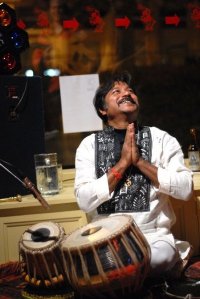
The tabla (Hindi: तबला, Bangla: তবলা, Urdu: تبلہ tablÄ� from Arabic: طبل، طبلة tabl, tabla) is a popular Indian percussion instrument used in the classical, popular and religious music of the Indian subcontinent and in Hindustani classical music. The instrument consists of a pair of hand drums of contrasting sizes and timbres. The term tabla is derived from an Arabic word, tabl, which simply means „drum.“Playing technique involves extensive use of the fingers and palms in various configurations to create a wide variety of different sounds, reflected in the mnemonic syllables (bol). The heel of the hand is used to apply pressure or in a sliding motion on the larger drum so that the pitch is changed during the sound’s decay.
Sree Debasish Dass (Pintoo) Born in a very tradtional musical familly on May day, Sree Debasish Dass has carved a special niche for himself in the world of Tabla, the king of Indian percussion instruments. He was initiated into Tabla at the tender age of five by his beloved father Late Dilip Kumar Pandit a highly acclaimed Tabla player of Farukkabad Gharana.
True to his date of birth, which symbolises sincere labour, Debasish (popularly known as Pintoo) put in years of relentless effort and unfailing dedication to master the art of playing Tabla. He completed his graduation from the world famous Visva-Bharati University founded by the great Rabindra Nath Tagore.
Thereafter he plunged fully into the subtle complexities Tabla and completed his Diploma in music, Bachelor and Master degree in Tabla. And there after; Late Pandit Dilip Kumar Das too our family to Satiniketan where he joind in the world famous University there as a professor.
When ever I come to Europe I feel there is a great need for the elderly people who needs care…….. So I have dream to start a place where my spiritual family members will come during the winter and stay with me….. Where there will be somepeople who will take care of them and there will be Yoga and music every day……… there will be a place where they will walk and walk with self esteem too. I do not know how but I feel I must do this….. because I have got much from them…..
